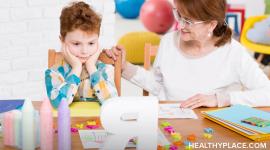How Parents Can Help Their ADHD Child

Excellent insights into parenting a child with ADHD. Here's how to help your ADHD child and reduce your stress.
Children with ADHD have a hard time paying attention. They act without thinking first. They also tend to be more active than children without ADHD. Children with ADHD often don't finish things, don't seem to listen to adults, and don't follow rules very well. They often seem very mad and sad. They wish people wouldn't be so mad at them. They wish people would know how they feel inside.
There are ways you as a parent can help. Picture a team. To win, everyone must work together. It is the same with helping a child with ADHD. You can be like a coach. And patient, caring, understanding coaches often get the best results. But the best coaches are also firm and fair, and they expect those they are helping to stick to the rules. When you can mix caring, concern, firmness, and fairness, ADHD children can learn to do better. And they feel better about themselves. This reduces the stress on you as a parent!
Focus on your child's experience
Children with ADHD just don't do things like other children. They seem to waste time and may act younger than other children their age. You may think they should know better. It's easy to be angry and upset with them. When you start to feel angry, it helps to try to look at the world through the eyes of your child. It can be a tough world to live in!
Children with ADHD have a hard time paying attention, even when they try and try. They hate to fail but can't seem to help themselves. They are not causing problems on purpose. But they start to think that others expect them to fail. This makes them very sad and sometimes mad. But children with ADHD are often curious, creative and smart. They just don't know how to focus all that energy in a way that works and pleases others. Sometimes it helps for parents just to say, "I know it's very hard for you. But we will work on it together." Instead of feeling "bad," this lets the child feel like the parent will work with him or her to solve a problem
Get to know your child
Of course, you know your child. This section is about taking a second look, and looking for certain things.
All children with ADHD have things they do well. And they have areas that are special problems. Many parents have found that paying close attention to both "strong" and "weak" areas is very helpful. Knowing what things your child does well will help you build on those skills. And praise for doing well in those areas of strength can build up the child's sense of being "good."
Successful parenting of children with ADHD requires a close bond, patience, and an ability to laugh with your child. We suggest you try to look for good things that your child does, not just the problems. You will find many positive things about your child-those things that interest, excite, and keep their attention. Talking about these things with your child will make him or her very happy.
At the same time, knowing your child's problem spots will let you watch for them. When you see a problem spot, you can pay special attention and help them learn other ways to act. You can focus your "coaching" efforts in the areas in which your child needs the most help. You will also begin to notice how they react to failure and how hard they are trying. Once you see how hard it is for them and how hard they are trying, it may be easier for you to work together.
If you and your child work together and share common interests, then you are working as a team. This will help your child accept learning to pay attention to the rules and chores you have for him or her. Having fun with your child, by sharing activities that are of interest to both of you, will give you strength and patience as you tackle difficult learning tasks together.
Communicate with your child
Let your child know that you are there to help him or her through the problems that he or she may have. Let them know that you love them and like who they are. Let them know that you understand how hard it is for them to pay attention or to be still. Letting your child know that he or she is loved and that you like to spend time with him or her will make the tasks you solve together feel more like helping. Remember that it is easy for children to think you want them to change because you don't like them. They don't know that it is how they act that needs work. They start thinking it is who they are that is a problem.
Talking to a child with ADHD can take much patience. Often they don't seem to listen. But they do listen and they do want to please you. It's just so hard for them! It takes much time and loving patience. You play a key role in explaining things to your child. Sometimes it helps to put rules or reasons in their own words. And it's important to get right down "on their level." Many parents find that it is very helpful to make eye contact when explaining things. This helps make sure that the child hears and understands what he or she is told.
Changing Behavior
One of the biggest problems for children with ADHD is forgetting to think before they act. It's also hard to get them to carry out tasks that need to get done, such as homework. You can play a big role in helping them learn to do better. Again, it helps to think of yourself as a "coach." Below are several tools that you can use to help "coach" your child in learning some new things.
Help the child with ADHD to get organized
Children with ADHD have a hard time focusing. Their minds "wander" easily. Help them become more organized! There are a number of things you can try.
Tell your child clearly what you want them to do. When you tell your child to do something, we suggest you write out a short list. Make sure your child understands, in his or her own words, what you want. Be firm and clear about what you want your child to do. "Here is a list of things for you to do. Please finish your math homework, feed the dog, and take out the kitchen trash. These must all be done by 5 o'clock. Do you have any questions about what you are to do?"
Help them learn to STOP! and think things through. They need to learn that Actions and Results go together. You can coach them to train themselves to think, "If I do this, what will happen?" They can learn to do this with lots of practice and reminders. You might give rewards for times they remember. You will need patience when they forget. But, in time, it can happen.
You can provide help for your child in lots of other ways. A child with ADHD has so much trouble focusing. There seem to be so many other things to think about and look at! There are several ways you can help them:
- Break down large projects into small steps.
- Try to keep a routine in your home that your child can count on.
- Change is hard for kids with ADHD! Whenever possible, prepare for changes (moving, vacations, new school) ahead of time. Then your child will not get as overloaded with new things, places, and people.
Some children will actually do well in new situations for a while but soon they can become overwhelmed by the changes and new problems to solve.
Children with ADHD also often lose things. This can be very upsetting for you and for them. Make a plan to help your child remember where he or she puts things. You could set up a special place in your home where your child can put things that are needed every day (keys, wallet, book bag or backpack). Help them learn to put the items in the same place every time. This also gives you a way to keep track of these items.
Rewards
Try to give your child lots of praise and support. Children with ADHD often do many things well. But sometimes the good actions get lost. Sometimes these children think all they hear about is what they've done wrong. Make sure you take time to notice the good actions and reward these by calling attention to them ("Catch them being good!").
Plan ahead for rewards. Talk with your child about what he or she can expect. If possible, involve the child in planning what will happen if he or she does well.
Rewards work best when they are:
- predictable or expected;
- consistent - the same each time;
- clear; and
- fair.
You can try asking your child to tell you what he or she thinks you want him or her to do. The more they think about results, the more they will begin to be in charge of their own actions.
If your child can't finish a task, or does it poorly, at least let them know that their effort is still good. This will help your child know that the effort he or she has made matters to you. Children with ADHD become upset quickly. You need to help your child know that while things don't always work out, the effort put into a task is still rewarding. Getting these good messages from parents and adults means a lot to them.
The classic way of rewarding children is to let them earn something they want when they do what's expected of them. Earning points can be a good way of doing this. You can make a chart with the things you want them to do on one side, and leave a space for your child to mark off the tasks as they are finished. The next column should contain the number of points he or she will receive for doing the task correctly. The points can be used for something your child likes. This could be small amounts of money, a toy, or some fun activity.
Discipline
Children with ADHD often have trouble following rules. Using only rewards may not be enough. Use of firm but fair discipline will usually be needed. Of course, the purpose of discipline is to shape and guide your child's actions and behavior.
It is very important that your child knows exactly what he or she needs to change or stop doing. They need to know what you expect them to do. They also need to know exactly what will happen if they fail to do as expected. If you plan results ahead of time it is less likely you will react too harshly out of anger, as this is not usually very helpful.
In deciding on a plan to discipline your child, try to be fair. Make sure the punishment fits the situation. Discipline that is too harsh will not be helpful. It can make your child feel like giving up if discipline is too strong. Be careful not to expect more than your child is able to do. Wherever possible, make sure your child knows exactly what will happen if he or she does or fails to do certain things. Then follow through!
"Time-outs" are one way to discipline your child. Time-outs are specific periods of time that your child must spend alone in a certain place in the home. This could be their room or any other place where they are alone. The goal of a time-out is to teach your child to be able to pay attention to his or her own actions and feelings. The quiet and being by themselves of time-outs can help your child calm down if he or she is too active.
Decide ahead of time which actions will result in time-outs. Give a time-out every time your child does these actions. Time-outs should be used only for big behavior problems (such as hitting a brother or sister). If possible, don't pay attention to temper tantrums during the time-out. These are ways the child tries to get you to back down and give up. If you keep at it, he or she will learn that you mean what you say!
We have not talked about spanking because most experts on children believe this is not a good way of getting children to change their actions or to learn new ones. And spanking risks hurting the child or making him or her angry and upset. Many experts also believe that a child who is spanked is also more likely to use hitting with other children as a way of trying to work out conflicts. There are many other forms of discipline. What is important is that they help the child understand the expected results of his or her actions. Be firm. Be sure to help your child to make the connection: "Because you did such-and-such, here is what is going to happen."
There is a lot you can do to help a child with ADHD. We hope that you find the above ideas helpful. Remember that each child is different. You may need to try several different things before you find things that really work. In our next help sheet, we will talk about some things you can do to help yourself to feel less upset and frustrated.
Your doctor or therapist may have suggestions for books that you can read about ADHD. You may also find it helpful to contact the national office of Children and Adults with Attention Deficit/Hyperactivity Disorder (CHADD) at 1-800-233-4050. You may also want to contact the National Attention Deficit Disorders Association (ADDA) at 1-847-432-ADDA.
Sources:
- NIMH - ADHD publication
- CHADD website
- ADDA website
APA Reference
Staff, H.
(2022, January 17). How Parents Can Help Their ADHD Child, HealthyPlace. Retrieved
on 2026, March 4 from https://www.healthyplace.com/parenting/adhd/how-parents-can-help-their-adhd-child



